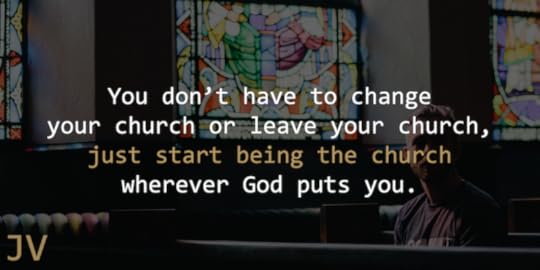Daniel Im's Blog, page 20
March 14, 2017
Unity vs Uniformity: A Key Issue for Urban Ministry

Is your mission to fulfill God’s purpose? Or is it your fame within God’s purposes?
This is a valid question for every Christian leader, but as Dhati Lewis states in his book, Among Wolves: Disciple-Making in the City, it’s especially important for leaders in the urban context. At the bottom of this post, be sure to enter the giveaway for a chance to win one of four copies of Dhati’s new book, Among Wolves.
What is Urban?
As sociologists Gottdiener and Hutchinson explain,
At the beginning of the twenty-first century, more than 3 billion persons—about half of the world’s population—lived in urban areas. By 2030, this number is expected to increase from 3 to more than 5 billion persons—some 60 percent of the total world population. This will be the first urban century in human history.
In the face of this emerging reality, Dhati and his team—through the church he’s planted, and the ministry he leads—have developed a strategy for indigenous disciple-making in the urban context. They’ve done this by embracing both density and diversity in the city context, and by creating a culture of effective disciple-making.
By 2030, 60 percent of the world is expected to live in urban areas.
Click To Tweet
Urban ministry is not the same thing as inner city ministry to the homeless.
Ministry to the homeless that happens in the inner city is definitely urban, but there are other dimensions that must be taken into account. For example, when a neighborhood is undergoing gentrification, you’ll have a ton of socioeconomic diversity.
Extreme poverty can be right beside extreme wealth.
For example, a family who has owned their house for generations may be forced out of their gentrifying neighborhood because they can’t pay the rising property taxes. Sure they might make a lot on the sale of their home, but where will they move? Their life and community are right there…and it has been there for decades. Is that fair just because some developer wants to build condos and make a quick buck?
Complex issues like gentrification and the mixing of socioeconomic classes are one of the many reasons Dhati defines urban as a combination of two words: density and diversity.
His goal is simple—to be the last generation forced to leave the urban context in the search of solid discipleship—and this is the focus of Among Wolves: Disciple-Making in the City.
Unity versus Uniformity
One church cannot do it all. One ministry cannot either. In the dense and diverse urban context, many churches and ministries are required to accomplish the breadth of needs that exist in any particular neighborhood or city. But there’s a big difference between unity and uniformity.
I love the way Dhati distinguishes the two:
Uniformity is a group of people pursuing a common purpose with only one strategy. This is when a person thinks that unity is assimilation, where the goal is to make look-a-likes of whomever the strongest or most prominent person in the room is. Uniformity kills true diversity in the body because it reinforces parroting, inauthenticity, and outward conformity.
Uniformity kills diversity because it reinforces inauthenticity & outward conformity.
Click To Tweet
Unity, on the other hand, is a group of people banding together for a common purpose, in their own unique strategies. Unity looks like a football team. You have a group of people with different positions and different responsibilities, but they are all trying to achieve the same goal. And that goal is what drives them. In unity, there is dignity, empowerment, and trust.
In unity, there is dignity, empowerment, and trust.
Click To Tweet
The key difference between the two is that uniformity shrinks the beauty of our complexities, and shrinks it to simple outward conformity. Unity reinforces mutual solidarity—rallying us around a common vision and goal.
Let’s be co-laborers in Christ because Jesus said that the harvest is plentiful, but the workers are few. Let’s band together and take up the charge to be the last generation forced to leave the urban context in the search of solid discipleship.
Next Steps:
Click the button above to enter the draw to win one of four copies of Among Wolves: Disciple-Making in the City by Dhati Lewis
Pick up a copy of Among Wolves
Watch or read the behind-the-scenes interview I had with Dhati on Urban ministry.
Learn about BLVD, the urban church planter training that Dhati leads.

February 28, 2017
Dealing with Conflict and Criticism

When collaborating with others, conflict is to be expected.
Conflict is inevitable when you’re actually doing the hard work of collaborating. After all, if there’s anything that’s a guarantee in leadership, it’s conflict and criticism. So how do you respond? Do you embrace it? Or avoid it?
If there’s anything that’s a guarantee in leadership, it’s conflict and criticism.
Click To Tweet
Conflict is not the problem, avoiding conflict resolution is.
So have conflict, and then wrestle to resolution. But whatever you do, don’t avoid conflict; it’s necessary for a healthy team. If you never have conflict on your team, then this might be symptomatic of a deeper issue.
Here are a few questions to ask yourself about your team:
Do people feel the freedom to say what they really think?
Are you, as a leader or manager giving enough ownership to those that you lead that mistakes are inevitable?
Or is the rope so short because you have control issues and you want everything to be “just right”? And by “just right,” I mean it’s your way or the highway?
Whatever you do, don’t avoid conflict; it’s necessary for a healthy team.
Click To Tweet
Allow people to disagree with you, but create environments for this.
In other words, when it’s planning and strategizing time, have a cone of safety where anyone can say anything. This is where differing points of view can come up and be wrestled with. But once you agree on a way forward, make sure everyone is on board.
Now what if people on your team have conflict with one another?
Instead of diving right in, start by asking whether or not they approached the other team member about this issue. Seek to understand what’s going on, but encourage them to figure out a way to solve the conflict before you get involved. If they do this and can’t come to an agreement, then you can come in as the third person to help resolve what’s going on.
Look for ways that you can adjust the circumstances that led to the conflict, rather than siding one way or the other.
Criticism Isn’t Healthy
While it’s a healthy thing to have conflict, and while I would even go so far to encourage you to cultivate conflict if there’s an absence of it on your team, criticism is another animal. Criticism is not healthy at all.
While a good dose of conflict is healthy for a team, criticism isn’t. You need to root it out.
Click To Tweet
So how do you deal with overt and subtle criticism when you notice it?
First of all, figure out who’s the one doing the criticism. If the individual loves playing the devil’s advocate, has a negative outlook on life, and has a critical nature, then my suggestion would be to let the specific criticism roll off your back, and instead address their critical nature instead.
But what if the criticism is coming from a few individuals?
Then my suggestion would be to take a good look in the mirror and take responsibility for anything that you’ve done to bring this about. After all, nothing is ever 100% someone’s fault, so own your part and apologize, if necessary. Then work towards a solution.
You’d be surprised at how the power of criticism is destroyed when it’s brought to the light—so have a frank, open, and honest conversation about it.
The power of criticism is destroyed when it’s brought to light.
Click To Tweet
In summary, when it comes to collaboration (click here for an article that I wrote on this important leadership competency), a good does of conflict is healthy for a team, but not criticism. You need to root that out.

February 21, 2017
Collaboration is a Leadership Competency

There’s a children’s book called Alexander and the Terrible, Horrible, No Good, Very Bad Day. It starts off like this,
I went to sleep with gum in my mouth and now there’s gum in my hair and when I got out of bed this morning I tripped on the skateboard and by mistake I dropped my sweater in the sink while the water was running and I could tell it was going to be a terrible, horrible, no good, very bad day.
Have you ever had one of those days? In 2004, the US Basketball team sure did.
1992 was the first year that professional basketball players were allowed to compete in the Summer Olympic games. This was the birth of the “Dream Team.” I remember watching Michael Jordan, Karl Malone, David Robinson, Magic Johnson, and Charles Barkley dominate. I had their basketball cards. I played them in video games. Man, this was the year for basketball.
From that year on, just like Canadians were always expected to dominate hockey, the Americans were expected to do the same with Basketball. After all, who could ever challenge them? Who could beat them? The Americans had not only won gold every time since the Dream Team had competed, but they had also never lost a game—they were undefeated.
But in 2004 it happened in Athens, Greece, the birthplace of the Olympics.
And although the US team had superstars like LeBron James, Carmelo Anthony, and Dwayne Wade, they lost their opening game in the tournament against Puerto Rico—a team that they should’ve crushed. Instead, they got crushed and were beat 92-73. This was the biggest loss in Olympic history for the US; in fact, it was their first loss ever. Their performance was a far cry from the original Dream Team who typically beat their opponents by 44 points.
Was this the end of the Dream Team?
Well, as much as they scrapped their way to the semifinals, they were eventually defeated by Argentina. Since NBA players were allowed to compete in the Olympics, 2004 was the only year that the USA men’s team did not win gold. In fact, 2004 was the only year they ever lost a game too. In 1992, 1996, 2000, 2008, 2012, and 2016, not only did the US men’s basketball team win gold, but they went undefeated.
So what went wrong?
I only have one thing to say—just one thing. You know that phrase, “Teamwork makes the dream work?” Yeah…I know, pretty amazing, right? Well, apparently they didn’t know that…
Collaboration is the ability to work with others
In this previous article, I outlined the two-year process that I was a part of to identify the universal core competencies of church leaders. Collaboration was one of them. This was a competency that just kept on coming up.
In order to collaborate well, you need to start by working with others
Click To Tweet
While collaboration is simply defined as the ability to work with others, it goes far beyond that. To collaborate well, yes, you do need to display proficiency in your ability to work with others.
But as you grow in this competency, as a leader, you need to learn how to:
Work through others
Work through leaders
Work through teams
And ultimately, work through team leaders
Collaboration is far from being a one-dimensional skill.
In our ever-connected, always accessible age, collaboration is not only being intentionally taught from childhood onwards—where children are now sitting in tables instead of rows—but success in ministry is becoming near impossible without it.
Success is near impossible unless you know how to collaborate.
Click To Tweet
The 2004 men’s team did not lose for lack of talent. Nor did they lose for lack of effort, since it was their reputation on the line. They lost because they didn’t know how to work as a team. They were a team of superstars, not a superstar team. And the same is true for churches that are failing to collaborate.
This is the foundation to working with others: it’s being able to work effectively and get things done when no one else is looking and when you don’t have any deadlines.
Basically, it’s the ability to take responsibility for yourself. Collaboration is all about learning how to lead yourself. This is where it begins. It’s about being faithful in the little.
Whoever is faithful in very little is also faithful in much, and whoever is unrighteous in very little is also unrighteous in much (Luke 16:10, CSB)
Collaboration is all about learning how to lead yourself. This is where it begins.
Click To Tweet
Before you can lead others, you need to know how to lead yourself.
I often return to what Sun Tzu, the Chinese general, military strategist, and author of The Art of War wrote. Let me paraphrase him,
If you know your enemy, you’ll win half of the battles. But when you know yourself, you’ll win the other half.
So how are you doing at the task and responsibility of leading yourself?
Do you know your strengths?
Are you managing your weaknesses?
Join me next time as I outline how to deal with the absolute inevitable when collaborating with others: conflict and criticism.

February 14, 2017
Should You Love Those You Lead?

The only people who can hurt you deeply are the ones you allow to get deep inside your soul. This is what makes love so dangerous. – Erwin McManus
In order to be an effective leader, do you need to love those you’re leading? Is love a competency that a leader needs to display proficiency in?
When it comes to the task or the domain of your work, love will go a long way. After all, when you love what you’re doing, time flies. Can’t you remember doing something for hours upon end, only to realize that it’s past midnight? Mihaly Csikszentmihalyi calls this flow. This is what it means to work in your area of greatest talent or strength.
But what about the people you’re working with? Do you need to love them in order to be an effective leader?
The straightforward answer is no. There are a lot of people that I’ve worked with that I definitely did not love. Now obviously, I’m not talking about the romantic sense of love. I’m talking about the sort of brotherly love that causes you to care for, think about, and want to hang out with others outside of work hours.
For some, this sounds like crossing boundaries. “Shouldn’t work be work and personal life be personal life?” While there are many that still hold to this view, there are an increasing number of leaders–millennials especially–that want to see that line done away with.
Just think about it. If you had the choice, wouldn’t you want to love what you’re doing and love who you’re doing it with?
Expertise in skill and knowledge are important to do your work well, but passion just brings it to another level. When this happens, time flies and your team produces its best work. This is because everyone’s heart is in it. It’s not just a job to get a paycheck, or a task to be checked off.
Skill and knowledge are important, but passion brings your work to another level
Click To Tweet
Here’s the catch though, and Erwin McManus puts it well, “The only people who can hurt you deeply are the ones you allow to get deep inside your soul. This is what makes love so dangerous.”
When you love those you work with, get ready to be hurt.
This is because the people closest to you have the greatest power to hurt you. So when you allow your heart to get into your work, and you allow yourself to start caring for and loving those you’re leading and working with, you need to prepare yourself for the possibility of hurt.
The people closest to you have the greatest power to hurt you
Click To Tweet
It’s worth it though. The risk is worth it.
I’ve come out on both sides and survived to tell the tale. On the one hand, I’ve been a part of a team who genuinely loved each other and wanted to live life and do work together. We were always together. Even when we weren’t working, we’d want to hang out with one another. On the other hand, I’ve been a part of a team that clocked in and clocked out–that was it. We didn’t talk outside of work hours. Work and personal life were completely separate.
And although the years I spent with that one team–who I loved and allowed to get into “my soul”–ended in heartbreak, I’d do it again. I’d do it again because the flip side is far too redundant and “professional.”
So back to our original question, in order to be an effective leader, do you need to love those you’re leading? Is love a competency that a leader needs to display proficiency in?
To make a lasting impact, and one that you’re proud to say that you were a part of, the answer is a resounding yes.

January 31, 2017
Learning To Wait…Again

My wife, Christina, was recently asked to speak to the group of moms at MOPS. I was so inspired by her talk, that I asked if I could post her transcript here as an article. I pray that this is as inspiring to you as it was to me.
The other day, Victoria asked me if the photos back when I was her age were in color or in black and white. Slightly offended, I answered “Oh hunny, I am not that old. Of course they were in color.”
Daniel, my husband, continued the conversation by telling our children that “Back in the day we didn’t have digital pictures. We had to take a picture with a camera that would only allow 25 pictures, then take them to be developed.”
They all had blank stares on their faces. They literally could not imagine a time when you couldn’t instantly see your selfie.
The majority of us grew up in an interesting time. We can remember not having internet, to all of a sudden having our parents yell at us to get off the dial up because they needed to make a phone call.
We remember having to wait for so.many.things.
Waiting for a snail mail letter to come, waiting to use the only phone at home, waiting to use the pay phone. Waiting was a part of our daily lives. It was just a matter of fact. We may not have enjoyed waiting, but what other choice did we have?
But nowadays, with new technology, there is an insatiable thirst for everything in an instant. In an essence, we have forgotten how to wait.
In an essence, we have forgotten how to wait.
Click To Tweet
Just ask Google. Google aims to load a page in half a second, since their research shows that most people will abandon a site or try to reload if it takes longer than two seconds to appear. Can you believe that? Google knows that our expectation is for the answer to be in our faces in less than two blinks of an eye.
Now, don’t get me wrong. I love things in an instant.
The convenience of our society trying to make things easier, faster, brighter, filtered, and shinier is addicting. But, have you ever stopped to ask yourself: What is this doing to my soul? My spiritual journey? My relationship with Christ?
I am reminded of the time that I completely missed baby Jesus.
In Canada, one of our family’s Christmas traditions was to attend a local church’s Walk of Bethlehem. For those not familiar with this event, a church essentially transforms their building into an interactive city of Bethlehem. The one we attended had live animals, Roman soldiers, singing angels that came out swinging from the rafters, vendors pretending to sell you pottery and fabric and fresh pressed olive oil.
It was loud, chaotic, and crowded…probably a lot like how it was in that day.
I was so excited to take Victoria to experience this event. She was two, ferociously curious, and easily thrilled. She loved every single moment of it.
When the walk through was done, groups were brought into the church’s auditorium for cookies and hot chocolate. I think I was more excited about that than Victoria. Daniel and I chatted and laughed about every little cute thing that she did.
As we were walking back to the car, Daniel asked me how old I thought the baby was that was playing baby Jesus.
“Baby? What baby?” I asked.
“You know,” Daniel said, “The one that Mary was holding in that make shift stable where the cows were off to one side; the final part before we went to get the cookies.”
To my horror I realized that I had completely missed that whole scene! I was so busy being busy and thinking about the cookies that I missed Jesus!
Are you ever so busy that you miss Jesus in the everyday?
Click To Tweet
I share with you this slightly embarrassing story because I think it perfectly illustrates the need to learn to wait, to slow down, and to allow space between question and answer so that we don’t miss Jesus or what He is doing.
The Bible is filled with stories of waiting.
Noah and his family waiting for the rains to stop, the Israelites waiting for the promised land, Mary and Martha waiting for Jesus to come to heal their sick brother Lazarus, the woman waiting for Jesus to pass so that she could touch the edge of his hem and be healed from her 12 years of bleeding, the waiting between Good Friday and Easter Sunday, and the waiting for the promised Holy Spirit.
While all these stories are about waiting, they also have something else in common. These stories are about trust.
These people trusted that God would come through. They knew Him, they loved Him, and they put their faith and hope in Him. They chose to turn to God during these difficult times and in the end were able to experience the promises of God.
I think one of the toughest parts about starting a New Year is the expectation that “we are starting fresh.”
We try to convince ourselves that last year’s pain – maybe a broken heart, a job loss, a death in the family, a sick child, an unanswered prayer – will not and cannot follow us into the next calendar year. So, maybe we don’t allow it. We fill our schedules to overflowing, we re-fill our coffee cups to blanket over our lack of sleep, we celebrate our busyness and our productiveness, and like Dory says, we convince ourselves to “just.keep.swimming.”
But, what if we didn’t? What if we learned to trust God? What if we learned to trust God IN our waiting and WITH our waiting? What if we learned to wait with an expectancy, a hope, a deep-hearted knowledge that God is loving, that His timing is perfect, that He is good?
What if we learned to trust God IN our waiting and WITH our waiting?
Click To Tweet
And that, my beautiful friends, is my prayer for all of us today and for this upcoming year. That no matter what 2016 was and no matter what 2017 will be, that we choose to trust God and we choose to wait on Him.
Just like it says in Isaiah 40,
But those who wait upon God get fresh strength.
They spread their wings and soar like eagles,
They run and don’t get tired,
they walk and don’t lag behind.


January 24, 2017
The Impact of Commuting on Church Planting and Campuses
 Garrett Dash Nelson and Alasdair Rae
Garrett Dash Nelson and Alasdair RaeWhat happens when you plot four million commutes on a map?
No, this is not a bad joke. The answer is not exhaust clouds, headaches, or road rage. What you actually get is a different picture of the mega-regions—a cluster of interconnected cities.
A few years back, The Guardian wrote about this “endless city” phenomenon and how the mega-regions of this world are possibly going to be one of the most significant and problematic trends in the next 50 years. I mean, just consider the fact that Anna Tibaijuka, former director of UN-Habitat, discovered that half the world currently lives in cities, and by 2050, it’s estimated that 70% of the world will.
While moving into the city is definitely trendy, and a choice that many are making today, it’s not always affordable or the particular lifestyle choice that everyone wants to make. In fact, this is one of the reasons many millennials, according to 2014 U.S. Census Bureau data, are actually moving the opposite way—from the cities to the suburbs. (Think Millennials Prefer The City? Think Again.)
…which is why this new research on commuting and mega-regions is so insightful for church leaders.
While individuals may choose to move to, or stay in, suburban or rural areas, they are still commuting into the city for work. Hence, the rise of mega-regions.
Just take a look at the map (see above) from research that Garrett Nelson of Dartmouth College and Alasdair Rae of the University of Sheffield did using census data on more four million U.S. commutes.
What you see here is not a decline of the city, but an expansion of it, because of commuting.
Instead of abandoning the suburbs or rural areas to move into the cities, many are just choosing to commute instead. This is why, as you’ll see on the map, the commute distance into many of these cities can be quite long. For the commuter, they are not paying attention to city or county lines. Instead, as long as they have a road and a means of transportation, they will commute.
The Same is True for Our Churches
Why are we okay driving to church? Why do we commute to community? Why do we often pass several, if not dozens of churches, on our way to our church worship service on the weekend?
Why are we okay driving to church? Why do we commute to community?
Click To Tweet
I’ve lived in cities my entire life. From the 2.5 million Greater Vancouver area that I grew up in, to the 4 million Greater Montreal area and 24 million Seoul capital area that I pastored in, to the 1.8 million Nashville metropolitan area where I now reside. If there’s one thing I know and have experienced, it’s city life. In fact, long commutes have always been a part of my life. So instead of dreading it, I’ve just grown accustomed to it and have learned to leverage that time. My wife, Christina, likes to call it time in the margins. So, while on the bus or train, I read. While driving, I listen to audio books, podcasts, and the Bible. And while walking from one location to the next, I pray.
As a result, when we moved to Nashville, we decided that I would commute to work, but not to church. We did not want to commute to community.
Unfortunately, it hasn’t always been this way for us. In the last two cities we lived in, we were at least 30 minutes away from our church. Growing up as children, my wife and I both remember 45 minute long commutes to church every weekend.
So how is it that people can commute to your church from a neighboring city or the complete opposite end of your borough, district, county, or however else your region is divided, and still feel like they belong?
It goes back to mega-regions. Commuting is just a normal part of life. Just like people are willing to commute to work, many are still choosing to commute to church.
Just like people are willing to commute to work, many are still choosing to commute to church.
Click To Tweet
A Church in Every Neighborhood
Instead of kicking long-distance commuters out because you now have a neighborhood-missional-incarnational approach to church, what if you had a church or campus in every neighborhood? What if, instead of just having a heart for your community or city, you developed one for your mega-region? A missional-incarnational approach for your mega-region?
What if you had a church or campus in every neighborhood?
Click To Tweet
Have you ever plotted your membership roll on the map to see where everyone is coming from using a website like batchgeo.com?
If you discovered that you had a concentration of individuals who lived in a particular area of your mega-region, what would you do? Form a small group or mid-size community and leave it at that? Or would you mobilize that community group to be a potential launch team, or core group, for a future campus or church plant?
In most cases, long-distance commuters aren’t making the trek to your church because there aren’t any other churches around. They’re doing it because they connect with your DNA and what your church is about. They’re doing it because they have relational connections and feel like they belong.
Instead of enabling their commute to community, in which they would probably never invite a neighbor to your church because the commute is too long, what if you saw their presence in your church as a seedling for a future campus or church plant in their neighborhood?
Rather than rejecting the mega-region for the sake of incarnational and missional ministry, what if you figured out a way to leverage it?
*My post here was originally published on Dec 13, 2016 in Christianity Today.

January 17, 2017
The Power of Podcasts

What podcasts do you listen to?
When I downloaded my first podcast in 2008, I remember having to load it onto my mp3 player so that I could listen to it while walking my dog. It didn’t download automatically nor did it sync efficiently. It was quite a bit of work, but since I’m a learner, I was stoked at the possibility of learning while walking, commuting, and going from one place to another. Trust me, I’ve tried reading a book while walking and it never ends well.
But now it’s 2017. And since then, the percentage of U.S. adults who’ve listened to a podcast in the past month went from 9% in 2008 to 21% in 2016, according to a survey conducted by Edison Research.
Podcasts have passed the tipping point, which is why it’s now commonplace to talk about your favorite podcasts, in the same way we do with our favorite books or TV shows (Seth Godin believes we’ve actually hit a podcast surplus in his fascinating article here).
In fact, when we conducted our research on the State of Church Planting (you can download it here), we even measured the impact of podcasting on a church plant.
Take a look at this image. It shows the average number of commitments to Christ made in church plants who used podcasts as a form of communication versus those who didn’t. Amazing, isn’t it?
 NewChurches.com – The State of Church Planting
NewChurches.com – The State of Church PlantingIn fact, we also discovered that among new churches that utilized a podcast as a means of communication, 40% started another new church within their first 5 years of existence!
Not only are podcasts a great way to pass time while mowing your lawn, grocery shopping, commuting to work, or exercising, but they are a great way to develop yourself–both personally and spiritually.
Podcasts are a great way to develop yourself–both personally and spiritually
Click To Tweet
This is why I host the New Churches Q&A Podcast (we’ve recorded 100+ episodes), and love being on others.
Here’s a list of the other podcasts that I’ve been interviewed on over the past year:
Daniel Im: Surprising Factors That Make Canadian Churches Grow – Canadian Church Leaders Podcast with Carey Nieuwhof
EP 57: Daniel Im – The Jeremy Roberts Leadership Podcast
Going Outside with Daniel Im – Going Outside with Alton Lee Web
LP12: How to Plant Missional Churches (Daniel Im) – NexGen Podcast
Episode 11: Mid-Sized Groups – The Groups Matter Podcast
Episode 10: Daniel Im – Rejoice Church Podcast
041 Daniel Im – “Planting Missional Churches” – The Rising Generation Leadership Podcast
Using Technology to Unleash a Culture of Multiplication – Exponential Podcast
I’d encourage you to check these podcasts and episodes out!

January 10, 2017
Interview with Jeff Vanderstelt on Missional Practices

Recently, my friend Jeff Vanderstelt shared his heart on the Saturate Field Guide that he developed with Ben Connelly, another one of my friends and one of our regular authors at NewChurches.com. Here is the interview.
Q. How can an attractional church move towards being more missional using this book?
A. The book guides believers through a study whereby they will come to understand the gospel and its implications for discipleship and mission. As participants work through the daily study and exercises, they will learn to embrace their identity as God’s family, sent as servants and missionaries to the world. The guidebook is most effective when a small group of believers commit to go through it together. As they travel together through the study, not only will they be led to personally grow as God’s missionary people, but collectively they will learn to realign their lives together around God’s purposes and mission. The guide was designed to move people from being Sunday only believers to everyday disciples who make disciples together in community while on mission.
—— Enter the giveaway at the bottom of this article for a chance to win one of four copies of the Saturate Field Guide ——
Q. How do we normalize mission in the life of my church?
A. First of all, we need to preach the gospel indicatives – What is true about 1) who God is as revealed by 2) what God has done (especially in and through the person and work of Jesus Christ) leading to understanding 3) who we are in Christ. Then, we need to help people see how believing the gospel leads to new behaviors. The indicatives of the gospel lead to the imperatives of obedience.
The outcome of the gospel is mission
Click To Tweet
The reason this is key to normalizing mission in the church is because the church needs to understand that the outcome of the gospel is mission. God is a missionary God who sent his only son to rescue and redeem a people for his mission on the earth. God is missionary, and we are his missionary people. It begins with us understanding our true identity as God’s people. Charles Spurgeon was famous for saying: “Every Christian is either a missionary or an imposter.” There is not a category for non-missionary Christian. If you are a Christian, you are a missionary.
If you are a Christian, you are a missionary
Click To Tweet
Next, as people begin to understand, believe and live out their identity as missionaries, they also need to be taught that the mission of making disciples happens in the everyday stuff of life – not just church events or mission trips. In fact, the best place for discipleship is not the church event, but the home, the café, at work, at play…where we do life.
And lastly, leaders need to model it for the church. They need to show others how to be on mission in the everyday stuff of life, share their struggles, teach from their own life on mission. The church generally follows their leaders pretty well. So, a church not on mission in the everyday stuff of life may very well just be following their leaders’ examples.
Q. What’s the best way to train up future leaders and church planters in my church?
A. I think formal training is helpful, but very insufficient. Most churches, Bible schools and seminaries focus mainly on formal study and training. But it’s simply not that effective by itself.
You need to embrace a life on life, life in community and life on mission approach to leadership development.
Life on life is the kind of discipleship and leadership development that is visible and accessible. People need to watch our lives – our marriages, our parenting, our interactions with believers and non-believers, neighbors, friends and co-workers. They need to see us handle conflict, address sin, work through our own sin and brokenness. And we need to see the lives of those we are developing. Everyone can look the part in a classroom or church event. We need to see each other in all of life in order to examine where we still need to grow.
We also need life in community discipleship. Too often leaders are developed in one-on-one relationships only to become like the one who developed them. However, we want people to look more like Christ, not us. Therefore, they need a community to disciple them. They need men and women and a diversity of gifts equipping them regularly.
Jesus didn’t say, “Show up to class and listen to me teach.”
Click To Tweet
And lastly, we need life on mission discipleship. Jesus said, “Follow me, and I will make you fishers of men.” He didn’t say “Show up to class and listen to me teach.” He developed them while on mission. They learned what discipleship looked like because he did it to them, and he did it in front of them. Then, he watched them do it and trained them while on mission. Eventually, they could do it without him physically present (though he was still present in their lives through the Spirit). We won’t develop strong gospel-centered, missionally driven, Spirit-led leaders unless we train them in the middle of the mission of making disciples who make disciples.
It needs to be said, that all of this without prayer and any of this without the power of the Spirit, is futile. A church, a leader, a person seeking to engage missionally without the power and direction of the Spirit of God is an exercise in futility. That is why the guide also directs the participants toward regular prayer.
The Spirit of God is the best discipler. As Jesus was sent empowered by the Spirit, so are we.
Next Steps:
Pick up a copy of the Saturate Field Guide by Jeff Vanderstelt and Ben Connelly
Click here to learn more about this book and get additional resources.
Click here to read the book review I wrote for Christianity Today on Jeff Vanderstelt’s initial book, Saturate

December 20, 2016
A Lesson From a Reluctant Leader

Joseph is probably one of the most awkwardly and reluctantly blessed men in the world.
No I’m not talking about Joseph and the Amazing Technicolor Dreamcoat. I’m talking about the man in those nativity scenes that always seems to be awkwardly standing beside Mary. In the Scriptures, while he was prominent at the beginning of Jesus’ life, he surprisingly fades away from the narrative as Jesus gets older. This doesn’t mean he was absent. It just means that we don’t know much about him.
One of the things that we do know about Joseph is that he was Jesus’ dad.
Just think about the implications of that for a moment. How would Jesus have been different if Joseph didn’t raise him as his son? What if Joseph left? What if he did actually divorce Mary in secret (Matt 1:19)? What if Jesus grew up fatherless? Or if another man entered the scene? Would Jesus have been different?
Recently, my wife and I have been watching a show called, Designated Survivor. It’s about a low-level cabinet minister that becomes President of the United States after a catastrophic attack destroys the capitol building and the government’s leadership infrastructure.
In a recent episode, there’s this scene where a news reporter asks the President’s son what he thinks about the fact that his dad might not actually be his real dad. Now just imagine how you would feel if someone dropped a bomb like that on you.
In one of the following scenes, while the son is watching TV trying to soak in what he’s going to do, Mike, the secret service agent assigned to him says,
You know, my dad’s called me everyday since I joined the secret service, just to make sure I’m staying safe.
The son responds,
Mike I…I know what you’re doing…You’re trying to tell me, no matter what, my dad cares.
Mike then says,
No I’m telling you about my dad. He taught me how to hoop and how to talk to girls. He pretty much made me who I am today. The funny thing is, I didn’t know him till I was three. That’s when my mom married him. I never met my biological father. Those tests—they tell you biology…but they don’t tell you who your dad is.
So yes, while Jesus is the Savior of the world, our messiah, the prophesied one, and the one who destroyed sin and death—Jesus, while being fully God, was also fully man. And because he was fully man—and had a mom, dad, and siblings—we can’t neglect the crucial role that his family had on him.
Your family played a critical role in shaping you to be the leader you are today.
Click To Tweet
In other words, Jesus was shaped by his earthly dad.
When Joseph stuck with Mary and cared for his “adopted” son, this shaped Jesus. When Joseph brought Mary to Bethlehem, this shaped Jesus. And when Joseph listened to the angel that told him to get up and flee to Egypt since Herod was planning on destroying him, this shaped Jesus.
It wasn’t going to automatically happen. They weren’t going to be teleported to Egypt. Joseph had to get up, pack the caravan (the one with wood paneling on the side), chart the course, and bring his wife and his newborn son to Egypt.
Let alone the fact that they got up THAT NIGHT! Just imagine packing and moving within a moment’s notice?
So what does this have to do with being a reluctant leader?
While there are some areas in your life where you might have the title “leader,” there are many more where you are seen as a leader. These are the areas in our lives where, unfortunately, many of us are most reluctant to grab hold of our leadership responsibilities.
I’m primarily talking about the home. And in this article specifically, to parents. In other words, if you’re a parent, you’re a leader. So don’t neglect your children.
If you’re a parent, you’re a leader. So don’t neglect your children.
Click To Tweet
Your children are watching you:
They’re watching the way you get home from work
They’re watching the way you sometimes choose to be on your phone over interacting with them
They’re watching the way you connect or don’t connect with your neighbors
They’re watching whether or not you’re choosing to join together with the family of God and worship on a weekly basis, regardless of whether or not you want to
They’re watching whether or not you’re in biblical community with others
They’re watching whether or not you’re serving on a regular basis
They’re watching if you’re making reading the Scriptures a priority in your life or not
I know this may sound harsh, but trust me, I’ve had to preach this to myself first. So this is more of a confession than it is anything else.
Since parenting is often caught more than taught, let’s stop leading passively and reluctantly towards an end that we don’t even want. Let’s together stop being reluctant leaders.
After all, just like Joseph’s actions shaped Jesus, the same is true for you. Your actions are shaping your children.

December 13, 2016
How To Predict the Future?

Remember those Magic 8-Balls? I never owned one, but I had a few friends who did.
We never thought much of it, nor really gave it much credence. After all, how could an inanimate object predict the future anyway? If we only knew that there were 20 standard answers inside of the ball…
Nevertheless for fun, we would, one at a time, ask the Magic 8-Ball questions about our future.
As a pre-teen, our questions were usually about becoming professional hockey players or whether or not certain girls liked us. Once again, we never really gave it much credence—unless it gave us the answer we wanted it to.
“Signs point to yes,” “Outlook good,” and “Without a doubt,” were among my favorite answers. I think I remember throwing the ball against the wall when, “Concentrate and ask again,” “My sources say no,” or “Better not tell you now,” would come up too frequently.
Toys like these were so popular because they fed into our craving to have some semblance of direction for the future.
It was our longing to uncover the future, our desire to know our next steps, and our curiosity as to what’s around the corner that toys like this took advantage of. In a sense, this toy helped us predict the future—well, not really, but it at least gave us the illusion of doing so.
What if the way to predict the future was to simply look into the past? What if the best predictor of the future was the past?
This past weekend, I preached through Matthew 2 at my church (you can listen to the message here by clicking on the sermon from Dec 11, 2016). We’re in an Advent Series entitled, Jesus: The Story. So as I prepared this message, I decided to preach it from three different angles or lenses. Just like a movie director has several cameras he or she can look through, I noticed that this chapter could be viewed three different ways: from Herod’s camera, the Wise Men’s lens, and Joseph’s point of view.
What if the way to predict the future was to simply look into the past?
Click To Tweet
Herod’s Camera
Now, I knew Herod was pretty messed up, since “he gave orders to massacre all the boys in and around Bethlehem who were two years old and under” (Matt 2:16), but I didn’t realize the extent to his “messedupness.”
So I began looking into the history books to uncover Herod’s story. This was my driving question:
What if the cause for Herod’s manic behavior had to do with his past?
Herod, at the young age of 25, started his political career as the governor of Galilee in 47 BC, and everybody loved him. The Jews and the Romans admired his leadership, and he quickly became powerful and popular among the people.
He was so loved that other politicians, filled with jealousy, went behind his back and ousted him from governorship. Well, they were only partially successful, since he ended up becoming the governor of Coele-Syria instead—only serving to further his experience.
Over the next few years, Herod’s life was complicated, to say the least, as he had to deal with revolts, black mail, treason, and more. Eventually, he went to Rome and was promised Kingship, as long as he “took matters into his own hands,” and gained back control of the region.
So what did he do?
Pay close attention to this next part of the story because, as Henry Cloud so powerfully noted in his book, Necessary Endings, “the best predictor of the future is the past,” unless there has been some big change—and for Herod, there wasn’t.
The best predictor of the future is the past…unless there has been some big change.
Click To Tweet
Herod was the same man as a governor as he was when he became king, when Jesus was born, and when his kingship was threatened. So when Herod was promised Kingship of Judea as long as he took “matters into his own hands” and gained back control of the region, he went in like a bull in a china shop.
When he returned to Palestine from Rome, he recaptured Galilee, and then he captured Jerusalem. He then married the niece of the king, so that he would have a claim to the throne. Once that was settled, he went ahead and beheaded the king, and took his position as king of the Jews.
This guy doesn’t joke around.
And once he grew in power and became king, he basically “took care” of anyone who opposed him.
It’s like in the movie Godfather when Sonny said,
I want you to take care of that **** right away. Paulie sold out the old man, that stronz. I don’t want to see him no more. I want you to make that first thing on your list, understand?
I mean this guy, Herod, executed 45 of the wealthiest aristocrats because they sided with the man he beheaded, the previous king. And then he went ahead and confiscated all their property, adding it to his own kingdom.
He even went up against Cleopatra. And in spite of an earthquake killing 30,000 people in Herod’s land, he still ended up beating her forces.
Then over the next few decades, after accusing his first wife of committing adultery and sentencing her to death, he married over 10 women and had many sons. The only problem is, now he had all of these sons who began fighting over the throne to the point where one son, trying to poison Herod, accidentally poisoned one of his other brother’s who drank the poison by mistake.
Herod’s entire political career consisted of one person after another trying to gain control over his throne—including his family.
Since the best predictor of the future is the past, there’s no wonder why Herod acted the same way when his throne was threatened again—but this time, by a baby who was “born King of the Jews.”
Do you see this in your life?
While the best predictor of the future is the past, that’s not justification to stay the same, remain in sin, in weakness, and in bondage. That statement is only true, unless you experience big change. Unless you learn something new, consciously act differently, and develop new patterns of behavior, through the empowerment of the Holy Spirit, the past will be the best predictor for the future.
The source of lasting change, true change, and deep inner change is the Holy Spirit. Don’t forget this. But also, don’t neglect that you also need new patterns of behavior to accompany it.
The source of lasting change, true change, and deep inner change is the Holy Spirit.
Click To Tweet
If this resonates with you, let me encourage you to pick up any one of these resources. They will help you take your next step into change, freedom, and a future that’s different than the past:
Breaking Free – Beth Moore
Breaking Free Bible Study
Necessary Endings – Henry Cloud
The Good and Beautiful God – James Bryan Smith




